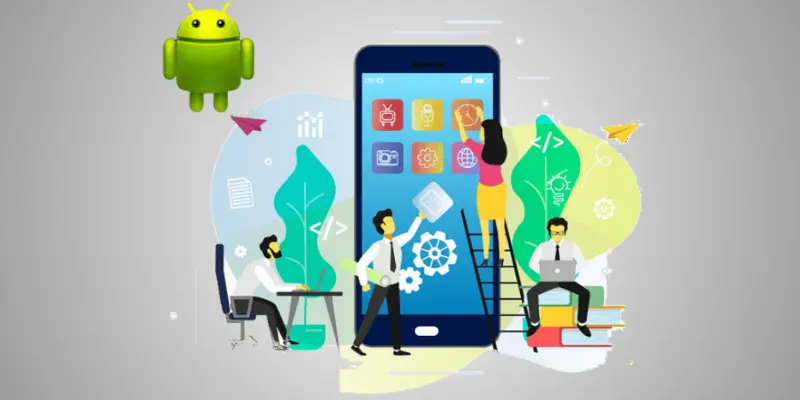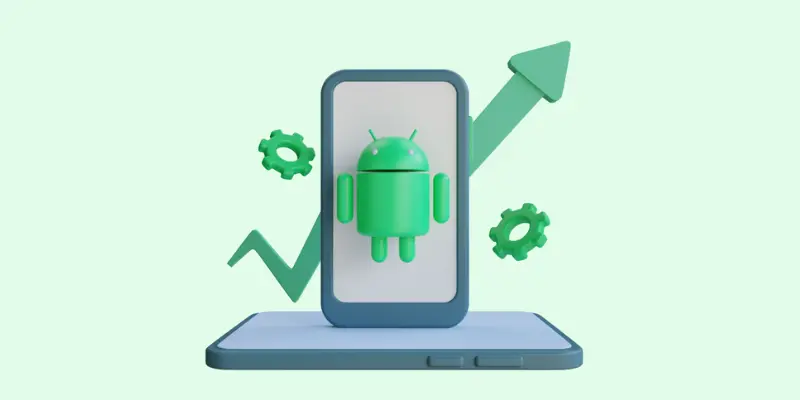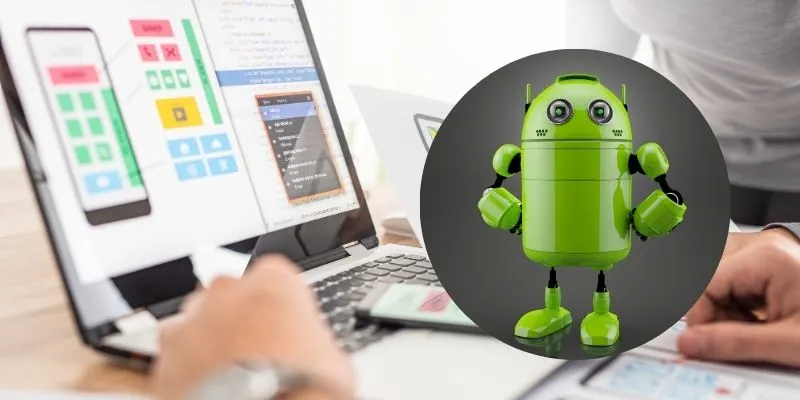Do you have any questions about what makes certain Android apps a hit while others struggle to be noticed in an increasingly competitive market? The answer /lies in the sheer dynamism of Android applications, in which creativity and creativity and a perfect toolkit can turn an idea into a basic application for daily use.
In the ever-changing landscape of Android, developers are constantly exploring new frontiers, hoping to be a part of the wave of technological advancements and tap into the latest trends in cutting-edge technology. Explore the Android app development ecosystem, where we'll look at the latest advancements and tools that make it easier to succeed in this fascinating field.
Why do Businesses Opt for Android Application Development Services?
Organizations or businesses consider a variety of aspects before launching Android application development. We will provide you with some pertinent factors that will further clarify the benefits of Android application development for every company.
Flexibility
The Android platform comes with the ability to be flexible. It is built on open-source technology, so developers have more options to customize the application according to their requirements.
Wider Reach
Android is among the most used mobile operating systems worldwide. In the process of creating an Android application for businesses can help them expand their reach and increase their customer base. This is why keeping up-to-date with the latest Android application designs is essential.
Multi-Device Support for the Apps
One of the biggest advantages of Android apps is that they can be used on a variety of devices, including smartwatches, smartphones, tablets, and even smart televisions. These capabilities greatly increase the possibility of promoting the application among users.
Cost-effective compared to other Apps
Companies know that creating an Android application is cheaper than making an iOS one. Android is an open-source platform and launching an app through it is also cost-free and simple.
Trends for Android App Development 2024
These figures show that Android smartphones are extremely popular compared to other operating systems. Android app development is essential for any business in these situations. It is vital to stay on top of the most recent trends when creating a mobile app to attract the interest of a large number of people.
We'll discuss the most recent changes impacting the Android market over the next few years.
5G Ushers in a New Era of Speed and Connectivity
The widespread adoption of 5G technology is expected to revolutionize technologies inside the Android technology ecosystem and facilitate development. With the unbeatable speed of download and upload, 5G opens doors for live-time capabilities, HD streaming, and immersive VR/AR experiences within Android applications. Hire android app developers can utilize the latest technology to create previously unimaginable applications that push the boundaries of interaction with users and capabilities.
Foldable Devices and Adaptable UI/UX
They're no longer just an idea that was originally conceived in the future. Today, there is a rapidly growing market for smartphones. In 2024, Android development will have to adjust to the evolving form. Developers must design UX and User Interfaces (UI/UX) that seamlessly transition between large unfolded screens and smaller, folded states, delivering the same experience across different kinds of devices.
Augmented Reality and Virtual Reality Take the Lead
AR and VR technology is not limited to specialized applications. In 2024 and beyond, we might see them integrated into the growing Android ecosystem. Imagine apps that overlay VR objects over the real world for improved shopping experiences, education, and gaming. Conversely, VR can transport users into fully immersive virtual worlds for entertainment, training, and even cooperation. Developers who master these technologies will be at the top of the line of future mobile technology.
Wearable Technology Integration Reaches New Heights
Wearable technology, which includes everything from smartwatches to fitness trackers, is gaining popularity. 2024 is the year that Android technology will play a crucial role in unlocking the full potential of wearables. Apps are expected to be integrated seamlessly with wearables, providing users with personalized health data, an easy way to control their devices on the go, and the ability to analyze data in real-time.
Rise of Low-Code/No-Code Development Platforms
The barrier to entry for Android app development is diminishing because of the increase in low-code/no-code applications. These platforms allow those without programming experience to build critical mobile applications using drag-and-drop interfaces and pre-built components. While they aren't suitable for more complex applications, they are a great way to make applications more accessible and let companies build basic tools internally or applications for customers without relying on experts.
Artificial Intelligence (AI) and Machine Learning (ML) Power Smarter Apps
AI and ML have revolutionized the way mobile applications function. In 2024, we can expect Android development to use these technologies to create innovative and user-friendly apps. Imagine apps that learn about users' preferences and personalize the user experience, offer chatbots powered by natural language processing, or utilize image recognition to create new features. AI or ML could revolutionize the way that people interact with Android apps.
Enhanced Focus on App Security and Privacy
With the growing data security and privacy concerns, Android 2024 development will be a top priority for rigorous security measures. Android developer for hire must follow top practices, like encryption of data and secure authentication. Regular security tests to protect the privacy of personal data. In addition, the transparency and control of the gathering of data and the way it is used is vital for building trust and maintaining an ongoing relationship with applications.
Super Apps Emerge to Simplify User Experience
Super apps, which are popular in regions such as China, are multi-functional platforms that can provide a wide range of functions within one application. In 2024, you could see this trend expanding within the growing Android ecosystem. Imagine a mobile app that combines social media for messaging, payments, food delivery, and other functions in one location, providing users with simple and effective methods to manage their daily tasks.
Mobile Commerce and Peer-to-Peer (P2P) Apps Drive the Digital Economy
Mobile commerce (m-commerce) business is on the rise, as are Android apps. They are the main reason for this development. In 2024, Android innovations will continue to meet the needs of shoppers on the Internet by providing new features, such as the ability to display products using augmented reality, secure payment gateways, and personalized recommendations. Additionally, P2P apps facilitating peer-to-peer transactions and sharing are expected to be popular and create new possibilities for entrepreneurs and developers.
Blockchain Integration for Secure and Clear Transactions
Blockchain technology, which is renowned for its transparency and security in data storage, offers enormous potential for Android development until 2024. Hire android developers can utilize blockchain technology to create apps that facilitate secure and tamper-proof transactions. They can also improve the efficiency of supply chain management or create decentralized marketplaces. Even though they are still at the beginning of development, integrating blockchain technology could revolutionize specific industries and provide distinct user experiences within Android applications.
Predictive Analytics for Personalized User Experiences
The big data and analytics of Big Data are transforming the design of mobile apps. By 2024 and beyond, Android app development is expected to leverage predictive analytics, which will allow for highly personalized user experiences. What happens if apps can anticipate users' needs and preferences, provide relevant recommendations, and then adjust their interfaces based on the user's preferences? Developers can develop more appropriate, exciting, practical, efficient, and profitable applications with data-driven insights.
Internet of Things (IoT) Enabled Mobile Apps
The Internet of Things connects our everyday devices to the Internet, creating an enormous data network and the possibility of developing applications daily. The year 2024 is when Android technologies will be vital in bridging the gap between humans and gadgets that can be intelligent. Find out which apps can control your home's smart appliances, check devices' fitness, and connect to cities' connected infrastructure. Hire android app developer who is proficient in IoT Integration will remain at the forefront of creating intelligent and interconnected systems.
Beacon Technology for Location-Based Services
The Beacon tech makes use of Bluetooth Low Energy (BLE) to transmit signals to devices that are in close proximity. In 2024, we could observe Android developing beacons to offer new services based on the location. What if apps could offer specific promotions to customers who visit an establishment, give them methods to navigate across large areas, or even provide personalized experiences depending on the location of the origin? Beacons are a great way of improving the engagement of users and creating user experiences on contextually sensitive mobile devices.
Instant Apps for Frictionless User Acquisition
Google's instant apps allow users to try apps' features without having to install them. In 2024, Android apps will benefit significantly from this technology. Developers can create lightweight, quick versions of apps that display the main features and encourage people to purchase the complete application to enjoy a better experience. This relaxed approach to user acquisition can bring about more app downloads and engagement.
Cloud Computing Integration for Scalability and Agility
Cloud computing gives users instant access to computing resources, which makes it an ideal solution for contemporary Android development. In 2024, developers will transfer their application infrastructure to the cloud continuously. Cloud integration enables the creation of scalable and flexible app development, more straightforward installation and maintenance, and improved collaboration between teams working on development. Cloud integration allows developers to create solid and secure Android applications.
Tools for Success in Android App Development
In the area of Android app development, the best tools can impact the final result of a highly regarded application, well-crafted and professional in its design, which needs fixing. If you're beginning to develop your Android app development process, be aware of these tools that can help you navigate the maze of options and help you succeed:
Android Studio: Your Development Hub
Android Studio serves as the foundation for Android application development. It is a legally certified Integrated Development Environment (IDE) that Google offers. With various features, Android Studio is the developer's most trusted partner. It includes a powerful code editor and a visual layout editor, which allows users to create user interfaces for applications and advanced tools to debug your apps. The IDE aids in developing and testing your application and is a complete and user-friendly tool for meeting your development requirements.
Kotlin Programming Language: The Future of Android Development
In the realm of programming languages designed specifically for Android, Kotlin has risen to the top of the list. It's concise and simple to comprehend and designed to work seamlessly with Java. Kotlin usage is growing because of its enhanced security features, precise syntax, and compatibility with existing Java code. As it grows and becomes more popular, Kotlin is quickly becoming the preferred choice of many Android developers.
Firebase: A Complete Mobile Development Platform
Firebase Google's platform for mobile app development comes with a wide range of resources and applications that significantly accelerate the development process. It provides real-time databases, cloud hosting analytics, and authentication services. Its Firebase real-time database is useful in developing dynamic and responsive applications and allows users to manage their management. Additionally, Firebase Analytics provides valuable insights into the habits of users, which lets developers make decisions based on data to improve their applications.
RxJava: Managing Asynchronous Operations
In the realm of Android development, managing asynchronous operations is essential. RxJava is a well-known and popular library that provides a solid and advanced solution. It helps you manage events and data streams within your application and allows you to deal with asynchronous data. With RxJava, you can manage complex data operations more efficiently and develop a more responsive and stable application.
Dagger 2: Simplifying Dependency Injection
Dagger 2 is a robust dependency injection framework that simplifies managing components and dependencies in an Android application. Dependency injection is essential for enhancing the flexibility and security of your application's code. Dagger 2 makes dependency injection easy, allowing you to concentrate on developing app features without worrying about dependency injection complications.
Git and GitHub: Collaborative Version Control
Effective control of application versions is crucial when working with collaborators on Android application development. Git is an open-source software that manages versions and lets you keep track of any changes made to your application's code. You can also collaborate alongside other team members and efficiently manage code. GitHub is a web platform built upon Git that provides a user-friendly platform to host and share code with the developer's community. It's a fantastic resource for collaborative projects with features like pull requests, issue tracking, and code reviews.
Testing Tools: Ensuring App Reliability
A thorough test is vital to ensuring the security of your Android applications. Various testing tools can be utilized, including Espresso for UI tests and JUnit to test unit functionality, two of the most popular. These tools can help detect and solve issues early in the development process, improving your application's overall performance and security.
App Distribution Platforms: Reaching Your Audience
Utilizing platforms to distribute apps, such as Google Play Store, is vital to reaching a broad public. These platforms are used to get your app in front of millions of potential customers. They additionally provide tools to manage the app's updates and analyze user reviews. An optimized listing for your application for the Google Play Store can significantly influence the visibility of your app as well as the number of downloads.
Continuous Integration/Continuous Deployment (CI/CD) Tools: Streamlining App Deployment
Tools for CI/CD like Jenkins Travis CI and Bitrise help simplify the application deployment process. They make it easier to manage the creation, testing, and deployment of the Android application. Automatization reduces the risk of human error, speeds up the release process, and ensures that your customers get updates in time and can access new features.
Android app development can be a complicated procedure that requires a powerful toolbox. These tools could be your partner when trying to create practical Android applications. With the right tools and knowledge of the latest trends, it's possible to create innovative, user-friendly, safe Android applications that stand out on the market for apps. By making use of the latest trends and using the features of these tools, you're well on your way toward Android applications that are successful in development.
Conclusion
In recent years, mobile app development businesses have received significant attention. This is because of the rapid growth in smartphone usage and digitalization. Today, we're much more inclined to convenience than any other.
This is where a reliable mobile application is practical. Therefore, it is a great idea to create a mobile app after thoroughly understanding all the current mobile app trends. The topics mentioned in this post are among the most crucial emerging mobile application development patterns to watch for 2024.
It is evident that they aren't the only ones. Technology is rapidly adapting to new conditions in the post-COVID era. Technology is advancing a variety of new solutions that aim to improve our users' experience. They have succeeded in breaking the restrictions on quarantine across the globe.
To be successful developers, you must be aware of the latest technological trends and develop products that people want. For developers or tech enthusiasts, now is the best time to master the art of creating mobile apps.












Share this blog